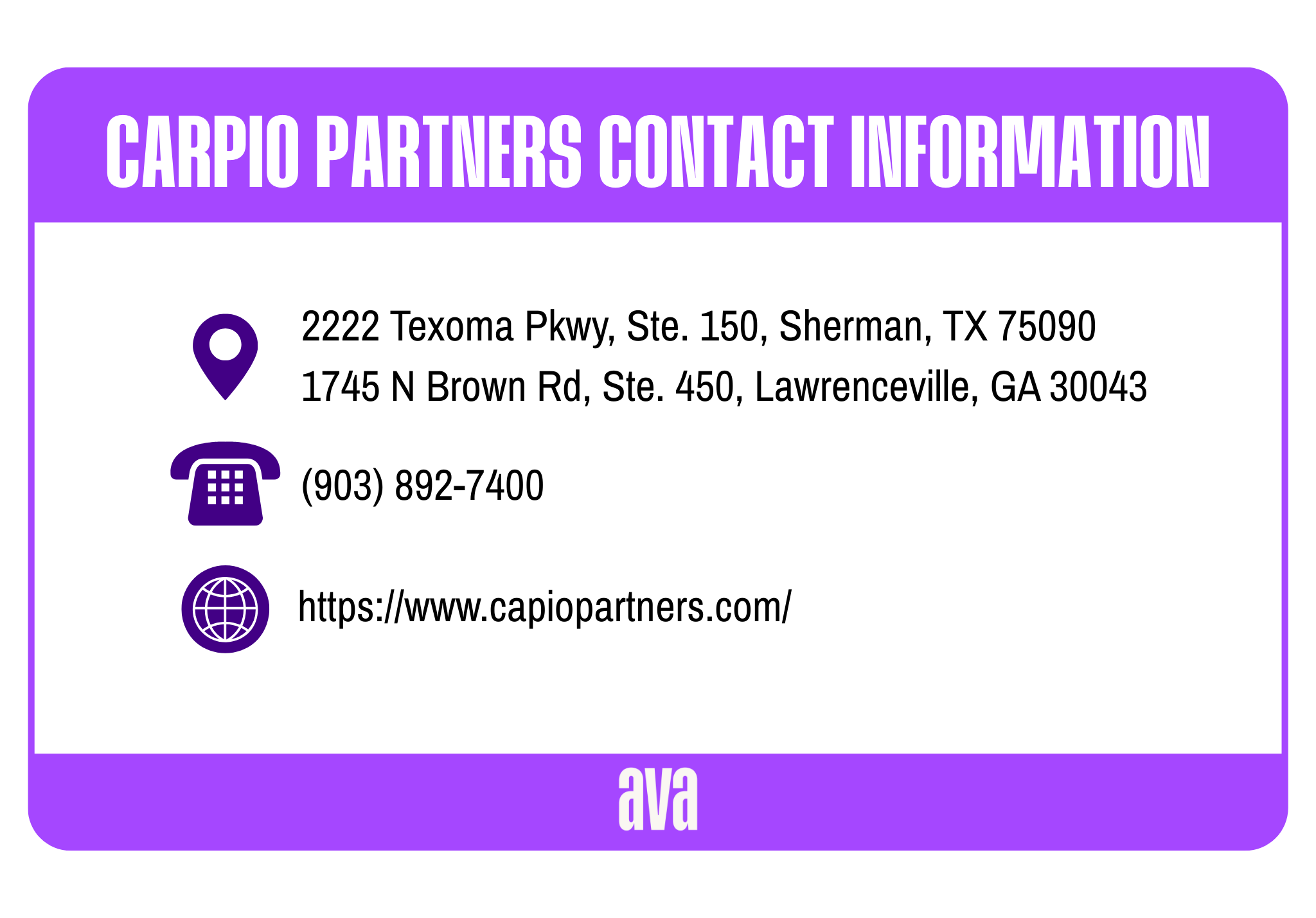Imagine this: you finally sit down to check your credit report and there it is — a collection account from Capio Partners. Maybe you’ve never heard of them, maybe the debt looks unfamiliar, or maybe it’s a reminder of a difficult medical situation. Either way, seeing “Capio Partners Collections” listed on your report can feel overwhelming.
The truth is, medical collections are one of the most common negative marks on credit reports, and Capio Partners is one of the largest players in this space. But don’t panic. You have rights, you have options, and with the right strategy you may be able to remove Capio Partners from your credit report or at least minimize the damage to your credit score.
This article walks you step by step through who Capio Partners is, how they operate, and — most importantly — what you can do to protect your credit history and start building it back stronger.
What is Capio Partners?
Capio Partners, LLC is a third-party debt collection agency that primarily deals with medical debt. Healthcare providers often give up on collecting unpaid medical bills after a certain period and “charge off” the debt. At that point, companies like Capio purchase the debt for pennies on the dollar and then attempt to collect the full balance from consumers.
If your unpaid bill was sold, Capio Partners now legally owns the account and can report it to the credit bureaus. That’s why you may see their name pop up on your credit report, even if you thought the hospital or clinic was the only entity you owed.

Capio’s contact details:
- Phone: (903) 892-7400
- Website: capiopartners.com
- Addresses:
- 2222 Texoma Pkwy, Ste. 150, Sherman, TX 75090
- 1745 N Brown Rd, Ste. 450, Lawrenceville, GA 30043
Capio Partners may reach out via phone, letters, email, or even text messages. While they are legally allowed to attempt collection, their actions must comply with federal law.
Is Capio Partners Legitimate?

Yes, Capio Partners is a legitimate business, not a scam. They are one of the largest purchasers of healthcare debt in the United States, which means they frequently appear on consumer credit reports when unpaid medical bills are sold to them. Being legitimate, however, does not automatically mean that the information they report is always accurate or that you actually owe what they claim.
In fact, errors in debt collection are surprisingly common. According to the Consumer Financial Protection Bureau (CFPB), debt collection is one of the top consumer complaint categories every year. Some of the most frequent issues include:
- Attempting to collect debts that don’t belong to the consumer: Sometimes, debt collectors pursue the wrong person due to mistaken identity, outdated records, or clerical errors. For example, if you share a similar name with someone else or previously lived at the same address, a debt that isn’t yours could end up reported under your file.
- Reporting debts that were already paid: Even if you settled a bill directly with the original healthcare provider, the provider may have sold your account to Capio Partners in error. If Capio’s records weren’t updated, they may continue to report it as unpaid, creating a negative mark on your credit history.
- Listing debts past the statute of limitations: Every state has laws limiting how long a creditor or collector can sue you for unpaid debt (usually 3–6 years). While an old debt may still appear on your credit report for up to seven years, it might no longer be legally enforceable in court. Some collectors still attempt to collect on these “time-barred” debts, which can mislead consumers into paying when they may not be legally obligated to do so.
For these reasons, you should never rush to pay a debt simply because a collection agency claims you owe it. Instead, the first step in protecting your credit report and financial health is to verify whether:
- The debt truly belongs to you,
- The balance is correct, and
- The debt is still legally collectible under your state’s statute of limitations.
By taking these precautions, you reduce the risk of paying money you don’t actually owe and put yourself in a stronger position to dispute inaccurate credit report entries or negotiate legitimate ones.
How Capio Partners Affects Your Credit Report
A collection account from Capio Partners can have long-lasting and serious consequences on both your credit report and your credit score. Because collections are viewed as signs of financial distress, they are categorized as derogatory marks — some of the most damaging types of information that can appear on your credit file.
Here’s how an active collection account from Capio Partners can impact different areas of your financial life:
1. Lower Credit Score
Collections have one of the most immediate and severe effects on your credit score. Depending on your overall credit profile, a new collection account can cause a drop of anywhere between 50 to 100 points or more. For someone with excellent credit, the impact may be even greater, since the scoring models weigh negative marks more heavily against borrowers with otherwise clean histories.
This drop can quickly move you from a “prime” borrower category into a “subprime” one, where interest rates are higher, approval odds are lower, and lenders see you as a bigger risk.
2. Loan Applications
When reviewing loan applications, banks and lenders look beyond your credit score. They also examine your full credit report. A collection account from Capio Partners is a red flag because it signals that you may have had difficulty meeting obligations in the past.
Even if you have a decent score, an unpaid collection can:
- Make it harder to qualify for mortgages, especially with government-backed loans like FHA or VA loans that have stricter requirements.
- Lead to higher interest rates on auto loans or personal loans.
- Force lenders to ask for larger down payments or additional proof of financial stability.
In some cases, a single collection account can be the reason an otherwise qualified borrower gets denied.
3. Credit Card Approvals
Many credit card companies, especially those offering rewards cards or higher credit limits, are quick to decline applicants with an active collection account. Even if your income is sufficient and your credit score is borderline acceptable, the presence of a collection tells issuers that you may not manage debt responsibly.
This can limit your access to credit at a time when you may need it most. Instead of qualifying for a prime rewards card, you may be forced to settle for a secured credit card or subprime card with high fees and low limits — which can make credit building more difficult.
4. Housing & Employment Opportunities
The impact of a Capio Partners collection doesn’t stop with banks and lenders.
- Landlords and Property Managers: Most landlords run credit checks on prospective tenants. A collection account, particularly one tied to unpaid medical or utility bills, can make you appear financially unstable. This could lead to higher security deposit requirements — or outright denial of your rental application.
- Employment Background Checks: Certain employers, especially in industries like finance, government, or law enforcement, review credit reports as part of their hiring process. A collection account may raise concerns about responsibility, reliability, or vulnerability to financial stress, potentially costing you a job opportunity.
5. Long-Term Impact
The longer a collection sits unpaid, the more it hurts your financial health. Not only does it continue to suppress your credit score, but it also accrues interest and fees in some cases, making the balance larger over time.
However, there’s one important piece of good news: collections don’t stay on your credit report forever. Under the Fair Credit Reporting Act (FCRA), most collection accounts fall off your report after seven years from the date of the first delinquency — even if they remain unpaid.
Still, waiting seven years isn’t ideal. During that time, you may face repeated denials for credit, higher borrowing costs, and missed financial opportunities. That’s why taking action to dispute inaccurate accounts, negotiate settlements, or work toward removal is often the smarter strategy.
In short, a Capio Partners collection isn’t just a line on your credit report — it’s a barrier that can affect nearly every corner of your financial life. Addressing it quickly can protect your credit score, open the door to better opportunities, and allow you to start actively rebuilding your credit.
Can Capio Partners Sue or Garnish Wages?

Yes, under certain conditions, Capio Partners may decide to sue if the debt balance is significant or if they believe they have a strong case to recover money from you. While not every collection account ends up in court, lawsuits are a real possibility — and if Capio wins, the consequences can be serious.
If the court rules in their favor and issues a judgment, Capio Partners can legally pursue remedies such as wage garnishment or bank account levies, depending on your state’s laws. This means a portion of your paycheck could be automatically withheld, or your bank account could be frozen until the judgment is satisfied. Even worse, a judgment itself becomes another negative entry on your credit report, further hurting your credit score.
Here are some important points to understand about lawsuits and garnishments:
1. Federal Protections
Even if Capio Partners wins a judgment, federal law protects certain income sources from being garnished. These include:
- Social Security benefits
- Veterans Affairs (VA) benefits
- Supplemental Security Income (SSI)
- Certain retirement accounts and pensions
This means that if your only source of income comes from these federally protected benefits, Capio cannot legally garnish those funds. However, it’s still important to notify your bank to ensure these protections are honored if your account is ever frozen.
2. State Laws Vary Widely
Each state has its own rules for wage garnishment and debt collection judgments. For example:
- Texas, North Carolina, South Carolina, and Pennsylvania offer strong protections, often prohibiting wage garnishment for most consumer debts.
- Other states, like California or New York, allow garnishment but limit the percentage of wages that can be taken (commonly 25% of disposable income).
Because state laws can make a huge difference in what Capio Partners can or cannot do, it’s always wise to research your state’s debt collection laws or consult a local attorney if you’re being threatened with a lawsuit.
3. Statute of Limitations
Another critical factor is the statute of limitations on debt collection. This law sets a time frame — usually 3 to 6 years depending on the state — during which Capio Partners can legally sue you for unpaid debt.
Once the statute of limitations expires, the debt is considered “time-barred.” While the debt may still appear on your credit report for up to seven years, Capio cannot take you to court to enforce payment. Unfortunately, some collectors still attempt to sue on time-barred debts, hoping the consumer won’t know their rights.
Warning: Making a payment or acknowledging the debt in writing can sometimes restart the statute of limitations clock. Always verify the age of the debt before taking action.
4. Don’t Ignore Legal Papers
If you receive a court summons or lawsuit notice from Capio Partners, never ignore it. Failing to respond to the summons typically results in an automatic default judgment against you, regardless of whether the debt is valid. Once a judgment is entered, your options to fight it become extremely limited.
Instead, take the following steps immediately:
- Review the documents carefully.
- Confirm the debt is valid and within the statute of limitations.
- Consider contacting a consumer rights attorney for guidance.
- File a response with the court within the required deadline (often 20–30 days).
In short, while Capio Partners collections can sue under certain circumstances, you are not powerless. Understanding your federal protections, state laws, and the statute of limitations can help you avoid unnecessary judgments and protect both your income and your credit report.
Main Strategies to Remove or Resolve a Capio Partners Collection

1. Request Debt Validation
When Capio Partners first contacts you, your most powerful tool is a debt validation letter. Under the Fair Debt Collection Practices Act (FDCPA), you have the right to request written proof of the debt within 30 days of their initial notice.
Your validation request should ask Capio Partners to confirm:
- The name of the original creditor (for example, the hospital or clinic that billed you).
- The total balance due, including all fees, charges, or interest.
- Verification that you are the correct debtor (to avoid cases of mistaken identity).
- Documentation showing how they calculated the amount owed.
If Capio Partners cannot provide this information, they must cease collection efforts and remove the account from your credit report. This can be one of the fastest and cleanest ways to eliminate an inaccurate or unverifiable collection.
Always send validation requests via certified mail with return receipt. This gives you a paper trail and proof of compliance with the 30-day rule.
2. Review Your Credit Reports
Even if Capio provides validation, that doesn’t mean their reporting is correct. Errors are common in the debt collection industry, and the Consumer Financial Protection Bureau (CFPB) ranks inaccurate reporting among the most frequent consumer complaints.
Obtain your free credit reports from the three major bureaus — Experian, Equifax, and TransUnion — through annualcreditreport.com
3. File a Dispute for Inaccurate Debts
If you identify errors in your credit reports, you have the right under the Fair Credit Reporting Act (FCRA) to dispute them directly with the credit bureaus. Each bureau must investigate your claim within 30 days and confirm whether the information is accurate.
The process typically works like this:
- File a dispute online or by mail with Experian, Equifax, and TransUnion.
- Provide documentation supporting your claim (billing records, payment receipts, or correspondence).
- The bureau contacts Capio Partners to verify the accuracy.
- If Capio cannot provide proof, the item must be corrected or removed.
For debts that don’t belong to you or are significantly inaccurate, this can be the most effective way to clear your credit history and immediately improve your credit score.
4. Negotiate Settlement, Pay-for-Delete, or Goodwill Removal
If the debt is validated and legitimately yours, you still have options to reduce its impact:
- Settlement: You can negotiate with Capio Partners to pay less than the full balance owed. For example, if the debt is $1,500, they may agree to accept $800 as a lump sum. While the collection will remain on your report, it will be marked “paid” or “settled,” which is better than leaving it unpaid.
- Pay-for-Delete: In this arrangement, you offer payment in exchange for the removal of the account from your credit reports. This is often done in writing to ensure accountability. While some collectors honor this, others refuse since the FCRA requires reporting to be accurate. Still, many consumers have had success, so it’s worth attempting.
- Goodwill Removal: This involves writing a goodwill letter to Capio Partners explaining your situation (such as job loss, illness, or financial hardship) and requesting the collection be removed as an act of goodwill. While not legally required, some agencies grant these requests, especially if you’ve already paid or settled the debt.
Important Reminder: Debt collectors are not obligated to grant pay-for-delete or goodwill removal requests. Always get agreements in writing before sending any money. Verbal promises often don’t hold up if disputed later.
In summary, whether through debt validation, credit disputes, or negotiations, you have multiple strategies to fight back against a Capio Partners collection. The right path depends on your specific situation — whether the debt is valid, whether it’s still enforceable, and whether you have the means to negotiate.
Your Rights Under the FDCPA
The Fair Debt Collection Practices Act (FDCPA) is a federal law designed to protect consumers from harassment, abuse, and unfair practices by debt collectors, including agencies like Capio Partners. Knowing your rights under this law can help you stay in control of the situation and avoid intimidation tactics that many collectors attempt.
Here are the key protections you should be aware of:
1. Restrictions on Calling Hours
Capio Partners cannot call you before 8 a.m. or after 9 p.m. in your local time zone. If you receive calls outside of these hours, they may be violating federal law. These limits exist to protect consumers from harassment during personal and family time.
If Capio Partners repeatedly calls outside of these hours, keep a written log of the dates and times. This record can be useful if you decide to file a complaint with the Consumer Financial Protection Bureau (CFPB) or seek legal help.
2. Contacting You at Work
If you inform Capio Partners that your employer does not allow personal collection calls at work, they must stop contacting you at your workplace. For example, if you work in a customer-facing role or at a company with strict HR policies, you have the right to tell the collector in writing (or verbally) to stop contacting you on the job.
3. Prohibition Against Harassment or Abuse
Debt collectors are strictly forbidden from using abusive, threatening, or profane language during phone calls, letters, or any other form of communication. This includes yelling, insulting, or making degrading remarks designed to pressure you into paying.
Harassment can also take the form of repeated, back-to-back phone calls with the intent to annoy or exhaust you. If this happens, document the call times and file a complaint.
4. False Representation
Capio Partners is not allowed to misrepresent themselves by pretending to be:
- Attorneys
- Government officials
- Credit bureau representatives
They also cannot send letters or emails designed to look like court documents if they are not actual legal filings. These scare tactics are illegal under the FDCPA.
5. Threatening Illegal Actions
Debt collectors cannot threaten to sue, garnish wages, arrest you, or take property unless they actually have the legal grounds and intent to do so. For example, if your debt is past the statute of limitations, Capio Partners cannot legally sue you — so any threats to do so would be unlawful.
6. Right to Request Written Communication Only
One of the most overlooked but powerful rights under the FDCPA is your ability to demand that Capio Partners communicate with you in writing only. This request must be made in writing. Once received, they must stop calling you and instead send letters or documents by mail.
This reduces the stress of constant phone calls, gives you a clear record of all communication, and prevents misunderstandings that may happen over the phone.
Key Takeaway: The FDCPA gives you tools to protect yourself against aggressive collection practices. If Capio Partners violates these rights, you can:
- File a complaint with the CFPB, Federal Trade Commission (FTC), or your state’s attorney general.
- Seek damages in court. In some cases, consumers may be entitled to up to $1,000 plus attorney’s fees for proven violations.
Medical Debt and Credit Score Changes in 2023
Big news for consumers: In April 2023, the three major credit bureaus announced changes to how medical debt is reported.
- Paid Medical Collections Removed: Once paid, medical collections no longer appear on credit reports.
- Debts Under $500 Removed: Any unpaid medical debt under $500 is excluded entirely.
- One-Year Waiting Period: New medical collections must be at least one year old before being reported.
This change wiped out about 70% of medical collections from credit reports, meaning some Capio accounts may already be eligible for removal.
How to Request Your Free Credit Report
Staying on top of your credit is essential. You’re entitled to one free credit report every week from each bureau at annualcreditreport.com.
When reviewing your reports:
- Highlight negative items like collections or charge-offs.
- Verify balances match your records.
- Check for accounts you don’t recognize (a sign of identity theft).
Monitoring your reports consistently helps you catch errors early and dispute them before they damage your score further.
Rebuilding Credit After Collections with Ava Finance
Even if you remove Capio Partners from your credit report, rebuilding your credit is the key to long-term success. That’s where credit builder tools like Ava Finance come in.
Ava Finance helps you:
- Build positive credit history through reported on-time payments
- Improve your credit mix without needing high-interest credit cards
- Monitor your progress toward a stronger score
- Learn smart financial habits through guided support
Collections can be setbacks, but Ava helps you prove to lenders that you’re reliable and responsible with credit moving forward. Over time, positive history outweighs past mistakes.
Conclusion
A collection from Capio Partners doesn’t have to define your financial future. By understanding your rights, requesting validation, disputing inaccuracies, and negotiating when appropriate, you can take steps to remove Capio Partners from your credit report.
And while cleaning up past issues is important, the bigger goal is building a stronger credit foundation. With tools like Ava Finance, you can establish consistent positive payment history, rebuild your credit score, and take confident steps toward financial freedom.




